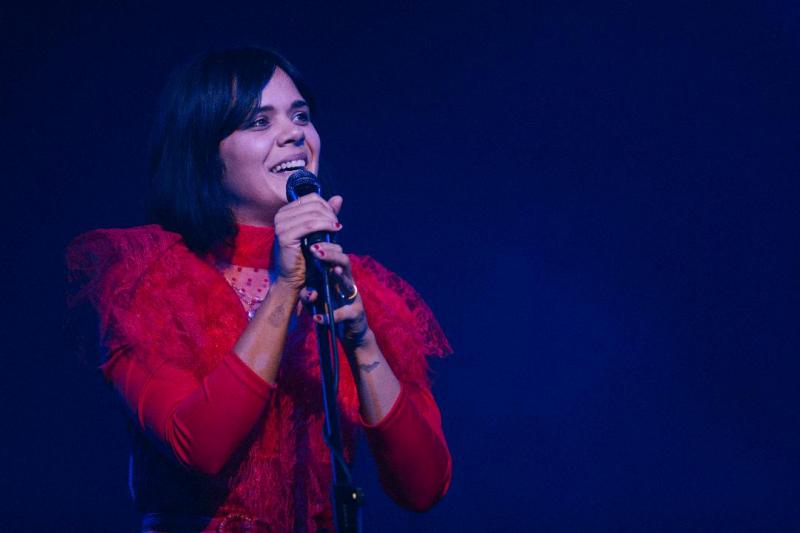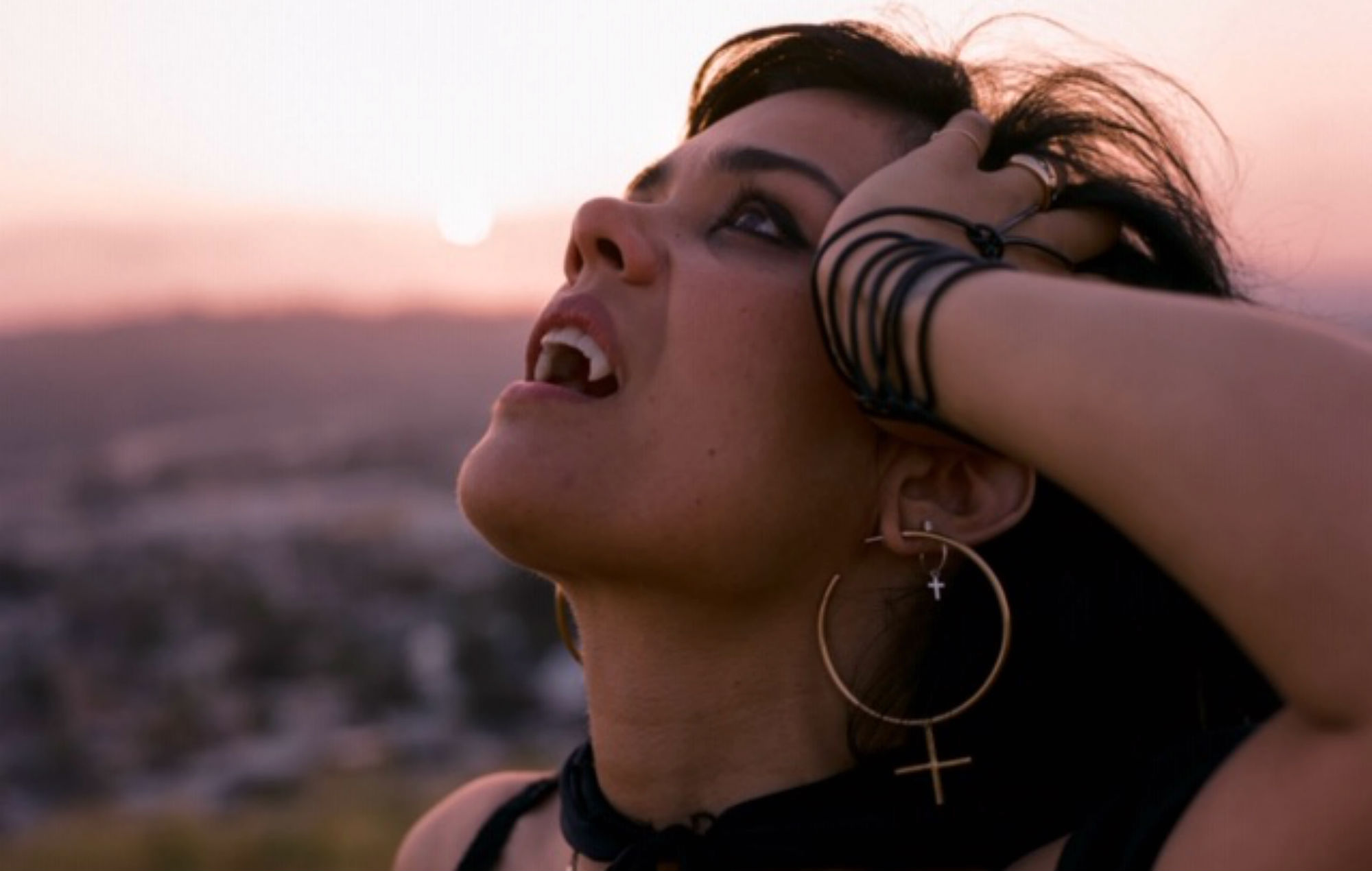Bat for Lashes, St Bartholomew’s Church, Brighton review – a heartfelt homecoming | reviews, news & interviews
Bat for Lashes, St Bartholomew’s Church, Brighton review – a heartfelt homecoming
Bat for Lashes, St Bartholomew’s Church, Brighton review – a heartfelt homecoming
Natasha Khan conjures LA pop myths and South Coast ghosts

Natasha Khan is ending this intimate UK tour where her dreams first took shape. Study at the University of Brighton began 12 years in the bohemian town, and her twice Mercury-nominated, mythology-minded pop life.
Khan’s fifth album as Bat for Lashes, Lost Girls, digs still further back, into a 1980s childhood where racism and her parents’ divorce encouraged deep immersion in The Lost Boys’ slick daylight vampires, Spielberg’s golden suburbs and grand synth glides. Now living in LA as an aspiring filmmaker, present circumstances and old fantasies have usefully fused in its narrative of a female vampire biker gang.
Lost Girls’ widescreen sensuality and nostalgia is heavily mined, as twin synths and Khan’s voice resonate in the faraway rafters. The consistent threads leading to it are, though, also woven in. Still wearing the red dress of her persona in previous album The Bride, so like something from an Angela Carter fairy tale, two of its songs gain new meaning now. Khan is inspired by her Brighton return to precede “Close Encounters” with a student poem, “Missing Time”, which clarifies its theme of alien abduction as trauma metaphor.
 Khan’s “ode to the English countryside”, “Land’s End”, is then sung by an LA artist missing home’s “fog and rain”. Her exploration of the “eerie” Dartmoor landscape which inspired it, she explains, ended with her equally unsettling, cloaked male guide encouraging “a blessing and a prayer” at an ancient rowan tree. Guitar now in hand, she sings of escaping “city lights” to let “my soul be free and spirit fly”. Her open-minded, all-embracing attitude to religion, spirituality, sexuality and myth feels right at home with a golden statue of Christ hanging above her, and stage lamps which glow like candles. It could be a wildly non-denominational, semi-secular Evensong.
Khan’s “ode to the English countryside”, “Land’s End”, is then sung by an LA artist missing home’s “fog and rain”. Her exploration of the “eerie” Dartmoor landscape which inspired it, she explains, ended with her equally unsettling, cloaked male guide encouraging “a blessing and a prayer” at an ancient rowan tree. Guitar now in hand, she sings of escaping “city lights” to let “my soul be free and spirit fly”. Her open-minded, all-embracing attitude to religion, spirituality, sexuality and myth feels right at home with a golden statue of Christ hanging above her, and stage lamps which glow like candles. It could be a wildly non-denominational, semi-secular Evensong.
One gorgeous, stark ballad, “Daniel”, is then paired with her best, “Laura”, a classic hit still awaiting its moment. Khan stands at the mic to honour the song’s profound party girl, willing her out of her subsequent comedown into still hedonistic glory, where she can “dance on the tables again”. The melody’s mellow flow adds to a kindly reverence for this fallen star, still riding high in her heart. Based on a friend it uplifted and Warhol’s doomed Superstars, “Laura” is another heightened pop myth.
The final element in a show which promiscuously rummages around Khan’s pop-culture subconscious is three heartfelt 1980s covers. Don Henley’s “The Boys of Summer” and Cyndi Lauper’s (and Roy Orbison’s) “I Drove All Night” fill in Lost Girls’ hinterland. Unironically venerating a grandiose era, her voice sinks low into smoky sultriness then soars, leaving the songs’ emotional lines simply lucid. Kate Bush’s vital example is honoured with “This Woman’s Work”, with the person who introduced her to it when she was 12 in the audience. Lauper’s poised feminine power – “I drove all night to make love to you/Is that alright?” – equals Bush’s insistence on restoring emotional loss: “Give me these moments back. Give them back to me.”
Khan’s stripped back format in this vast building contains her own pop power, letting it simmer, slow and stately. The covers demonstrate the grateful generosity of an artist just turned 40, but essentially unchanged from the dreaming student she was. That girl’s ghost is invoked so often that she can almost be glimpsed.
rating
Explore topics
Share this article
The future of Arts Journalism
You can stop theartsdesk.com closing!
We urgently need financing to survive. Our fundraising drive has thus far raised £49,000 but we need to reach £100,000 or we will be forced to close. Please contribute here: https://gofund.me/c3f6033d
And if you can forward this information to anyone who might assist, we’d be grateful.

Subscribe to theartsdesk.com
Thank you for continuing to read our work on theartsdesk.com. For unlimited access to every article in its entirety, including our archive of more than 15,000 pieces, we're asking for £5 per month or £40 per year. We feel it's a very good deal, and hope you do too.
To take a subscription now simply click here.
And if you're looking for that extra gift for a friend or family member, why not treat them to a theartsdesk.com gift subscription?
more New music
 Odd times and clunking lines in 'The Life of a Showgirl' for Taylor Swift
A record this weird should be more interesting, surely
Odd times and clunking lines in 'The Life of a Showgirl' for Taylor Swift
A record this weird should be more interesting, surely
 Waylon Jennings' 'Songbird' raises this country great from the grave
The first of a trove of posthumous recordings from the 1970s and early 1980s
Waylon Jennings' 'Songbird' raises this country great from the grave
The first of a trove of posthumous recordings from the 1970s and early 1980s
 Lady Gaga, The Mayhem Ball, O2 review - epic, eye-boggling and full of spirit
One of the year's most anticipated tours lives up to the hype
Lady Gaga, The Mayhem Ball, O2 review - epic, eye-boggling and full of spirit
One of the year's most anticipated tours lives up to the hype
 Slovenian avant-folk outfit Širom’s 'In the Wind of Night, Hard-Fallen Incantations Whisper' opens the door to inner space
Unconventional folk-based music which sounds like nothing else
Slovenian avant-folk outfit Širom’s 'In the Wind of Night, Hard-Fallen Incantations Whisper' opens the door to inner space
Unconventional folk-based music which sounds like nothing else
 'The Art of Loving': Olivia Dean's vulnerable and intimate second album
Neo soul Londoner's new release outgrows her debut
'The Art of Loving': Olivia Dean's vulnerable and intimate second album
Neo soul Londoner's new release outgrows her debut
 Music Reissues Weekly: The Peanut Butter Conspiracy - The Most Up Till Now
Definitive box-set celebration of the Sixties California hippie-pop band
Music Reissues Weekly: The Peanut Butter Conspiracy - The Most Up Till Now
Definitive box-set celebration of the Sixties California hippie-pop band
 Doja Cat's 'Vie' starts well but soon tails off
While it contains a few goodies, much of the US star's latest album lacks oomph
Doja Cat's 'Vie' starts well but soon tails off
While it contains a few goodies, much of the US star's latest album lacks oomph
 Mariah Carey is still 'Here for It All' after an eight-year break
Schmaltz aplenty but also stunning musicianship from the enduring diva
Mariah Carey is still 'Here for It All' after an eight-year break
Schmaltz aplenty but also stunning musicianship from the enduring diva
 Album: Solar Eyes - Live Freaky! Die Freaky!
Psychedelic indie dance music with a twinkle in its eye
Album: Solar Eyes - Live Freaky! Die Freaky!
Psychedelic indie dance music with a twinkle in its eye
 Album: Night Tapes - portals//polarities
Estonian-voiced, London-based electro-popsters' debut album marks them as one to watch for
Album: Night Tapes - portals//polarities
Estonian-voiced, London-based electro-popsters' debut album marks them as one to watch for
 Album: Mulatu Astatke - Mulatu Plays Mulatu
An album full of life, coinciding with a 'farewell tour'
Album: Mulatu Astatke - Mulatu Plays Mulatu
An album full of life, coinciding with a 'farewell tour'

Add comment